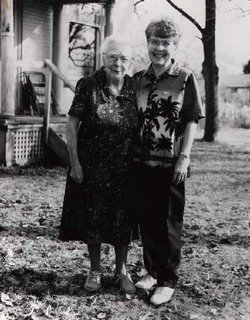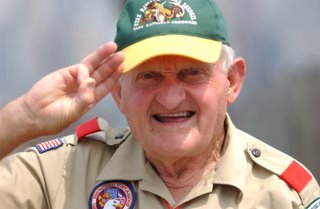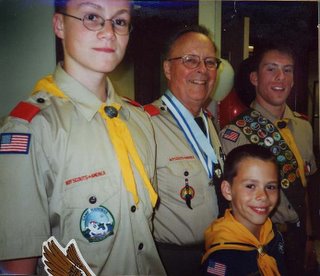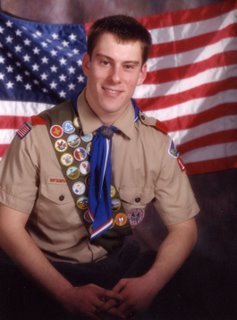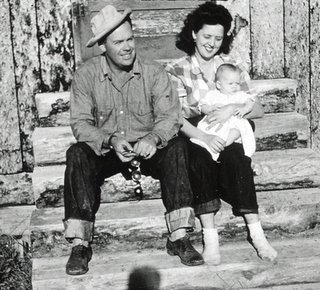Dan Mazur "A Lasting Legacy"
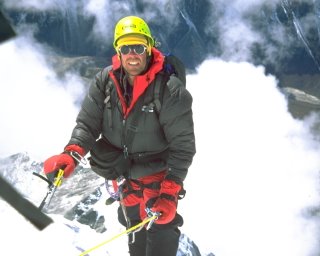 I was a Scout as a boy. I believe I made it to Star and was working on Life. Ours was an excellent troup and my time in the boy scouts was an important and positive part of growing up and still leaves a lasting impression on me.
I was a Scout as a boy. I believe I made it to Star and was working on Life. Ours was an excellent troup and my time in the boy scouts was an important and positive part of growing up and still leaves a lasting impression on me.Scouting was a great foundation for becoming an expedition leader. I started as a lowly tenderfoot and learned from the ground up how one can earn merit and advance to the higher levels through life. Those early lessons have propelled me and our teams to the summit of Everst, and back down again. Along the way, I have been blessed with opportunities to help others.
Its not always easy, but believe it or not, I still try everyday to be prepared to on my honor do my best, to do my duty to God and my country and to obey the Scout Law; to help other people at all times; to keep myself physically strong, mentally awake, and morally straight.
Thanks again for giving me such a great opportunity to tell the story of the rescue of Lincoln Hall. photo courtesy Duane Morrison
Wikipedia account Rescued on Everest, 2006
Hall was thought to have died while descending from the summit of Mount Everest on May 25, 2006, after suffering from a form of altitude sickness leading to him hallucinating and becoming confused. According to reports, sherpas attempted a rescue for hours but, as night began to fall and with their oxygen supplies exhausted and suffering from snow blindness, they were ordered by expedition leader Alexander Abramov to leave an apparently dead Hall on the mountain and return to camp. A statement was later released announcing his death.[1]
However, the next morning at 7am (12 hours later) Hall was found still alive at 8700m by a team making a summit attempt - Daniel Mazur Team Leader (US), Andrew Brash (Canada), Myles Osborne (UK) and Jangbu Sherpa (Nepal). Myles Osborne described the scene just below the Second Step:
"Sitting to our left, about two feet from a 10,000 foot drop, was a man. Not dead, not sleeping, but sitting cross legged, in the process of changing his shirt. He had his down suit unzipped to the waist, his arms out of the sleeves, was wearing no hat, no gloves, no sunglasses, had no oxygen mask, regulator, ice axe, oxygen, no sleeping bag, no mattress, no food nor water bottle. 'I imagine you're surprised to see me here,' he said. Now, this was a moment of total disbelief to us all. Here was a gentleman, apparently lucid, who had spent the night without oxygen at 8600m, without proper equipment and barely clothed. And ALIVE."
A rescue effort that mountain observers described as 'unprecedented in scale' then swung into action. Dan Mazur and his team abandoned their summit attempt to stay with Hall who was badly frostbitten and delusional from the effects of severe cerebral oedema, while a rescue team of 12 Sherpas, despatched by Abramov, climbed up from below. The rescue team comprised Nima Wangde Sherpa, Passang Sherpa, Furba Rushakj Sherpa, Dawa Tenzing Sherpa, Dorjee Sherpa, Mingma Sherpa, Mingma Dorjee Sherpa, Pemba Sherpa, Pemba Nuru Sherpa, Passang Gaylgen Sherpa and Lakcha Sherpa.
Hall was brought down the mountain, walking the last part of the way to Everest's North Col where he was treated by a Russian doctor. Hall arrived at Advanced Base Camp the next day in reasonably good health although suffering frostbite and recovering from the effects of cerebral oedema.[2].
Hall's survival and rescue on the mountain while extraordinary is not unprecedented. But it was especially poignant due to the death days earlier of UK climber David Sharp who, suffering as Lincoln Hall was from cerebral oedema, had died nearby. It was observed that no attempt was made to rescue David Sharp, although it was apparent that he was still alive while other climbers passed him and continued on their own summit attempts. It would be unfair to draw exact parallels between the circumstances of the two cases, and it would be wrong to conclude on the basis of the evidence that Sharp would have survived long enough to be rescued. But the case had raised concerns, including comments from Sir Edmund Hillary. The thought of the fate of David Sharp would have been in the mind of all of those involved in the rescue of Lincoln Hall, just as the latter's survival cast a new perspective on the fate of the former. Dan Mazur perhaps summed things up best when he said, reflecting on his team abandoning their summit attempt, "The summit is still there and we can go back. Lincoln only has
Thursday, June 08, 2006
Climber gives up Everest summit to rescue man
BINAJ GURUBACHARYA - The Associated Press
KATMANDU, Nepal -- Just days after a British climber was left to die near Mount Everest's summit, a guide from Washington state abandoned his second bid to stand on top of the world so he could rescue a mountaineer mistakenly given up for dead.
Not only did Daniel Mazur not scale the world's highest peak from the northern side, he also failed to get his two paying clients to the top. "It was very disappointing for me to miss my chance at the summit, but even more that I could not get my job done," Mazur, of Olympia, Wash., told The Associated Press upon returning to Nepal's capital, Katmandu, on Thursday.
Mazur, his two clients and a Sherpa guide were just two hours from the 29,035-foot peak on the morning of May 26 when they came across 50-year-old Lincoln Hall, who was left a day earlier when his own guides believed he was dead.
"I was shocked to see a guy without gloves, hat, oxygen bottles or sleeping bag at sunrise at 28,200 feet height, just sitting up there," said Mazur, who scaled Everest once before, from the southern side, in 1991. Mazur said Hall's first words to him were: "I imagine you are surprised to see me here." Mazur said he knew Hall was OK because he was not crying for help and still had a sense of humor. Mazur's team spent the next four hours pulling Hall away from the slopes, giving him bottled oxygen, food and liquids. They also radioed the base camp to tell Hall's surprised team he was still alive.
While Mazur's team was busy assisting Hall, two Italian climbers walked past them toward the summit. When asked to help, they claimed they did not understand English. On his return to base camp, Mazur discovered they did.
"I don't know why they didn't want to stop to help," Mazur said. "I hope when I am there, in that state, and someone passes me ... I hope it is someone like me."
Hall's rescue came just days after David Sharp, 34, died May 15, about 1,000 feet into his descent from the summit. Dozens of people walked right past him, unwilling to risk their own ascents. By the time some Sherpas showed up to help get Hall back to base camp, Mazur, his clients and his guide were too exhausted to attempt the peak. They had no choice but to return without completing their climb. "We all looked at the summit and then returned," he said. "We all agreed there was no choice."
But Mazur had no regrets. "Oh yeah, it was worth it," he said. "You can always go back to the summit but you only have one life to live. If we had left the man to die, that would have always been on my mind. ... How could you live with yourself?"
This story appeared in The Daily Herald on page A1.
How can others help?
In June, a family medical team led by Dr. Philip and Chantal Heinegg and Arnold Coster, SummitClimb's 4 time Everest leader, just returned from their trek to a newhealth clinic we are helping to foster in Nepal, the world's 12th poorestcountry and the poorest country in Asia, near to Mt Everest in a very poverty-stricken valley where tourists never tread and where there are no doctors, no medical facilities, no school teachers, no roads, no electrity
and no phones.
Some of the patients walked or hobbled for two days to get a chance to see the doctors. It's in a district called Okhaldunga, a valley where 4000 people toil on the steep Himalayan foothills of Everest. Not only did our medical team see nearly 100 patients in one day during their visit, some of whom had severe injuries that had been left untreated for months, they also donated a new solar panel and medical supplies. The clinic is part of efforts by the Mount Everest Foundation for Sustainable Development of Nepal and Tibet. We are trying to help them raise funds to help poor families living on the "wrong side" of Mt. Everest to get health care so they can go back to work in the fields and survive in their own village and raise their children with dignity, rather than migrating to the teeming unemployed slums of Kathmandu. If you are interested, please visit
www.MountEverestFoundation.org , and please consider sending a donation cheque to: Mount Everest Foundation, POB 123, Lakebay, WA, 98349. Thank you very much.
Dan
